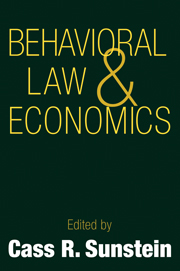Book contents
- Frontmatter
- Contents
- Contributors
- Acknowledgments
- Introduction
- Part I Overview and Prospects
- 1 A Behavioral Approach to Law and Economics
- Part II Heuristics and Biases: Shortcuts, Errors, and Legal Decisions
- Part III Valuation: Values and Dollars in the Legal System
- Part IV The Demand for Law: Why Law Is As It Is
- Index
1 - A Behavioral Approach to Law and Economics
Published online by Cambridge University Press: 05 June 2012
- Frontmatter
- Contents
- Contributors
- Acknowledgments
- Introduction
- Part I Overview and Prospects
- 1 A Behavioral Approach to Law and Economics
- Part II Heuristics and Biases: Shortcuts, Errors, and Legal Decisions
- Part III Valuation: Values and Dollars in the Legal System
- Part IV The Demand for Law: Why Law Is As It Is
- Index
Summary
Our goal in this chapter is to advance an approach to the economic analysis of law that is informed by a more accurate conception of choice, one that reflects a better understanding of human behavior and its wellsprings. We build on and attempt to generalize earlier work in law outlining behavioral findings by taking the two logical next steps: proposing a systematic framework for a behavioral approach to economic analysis of law, and using behavioral insights to develop specific models and approaches addressing topics of abiding interest in law and economics. The analysis of these specific topics is preliminary and often in the nature of a proposal for a research agenda; we touch on a wide range of issues in an effort to show the potential uses of behavioral insights.
We suggest that an approach based on behavioral economics will help with the three functions of any proposed approach to law: positive, prescriptive, and normative. The positive task, perhaps most central to economic analysis of law and our principal emphasis here, is to explain both the effects and content of law. How will law affect human behavior? What will individuals' likely response to changes in the rules be? Why does law take the form that it does? The prescriptive task is to see how law might be used to achieve specified ends, such as deterring socially undesirable behavior. The normative task is to assess more broadly the ends of the legal system.
- Type
- Chapter
- Information
- Behavioral Law and Economics , pp. 13 - 58Publisher: Cambridge University PressPrint publication year: 2000
- 148
- Cited by



